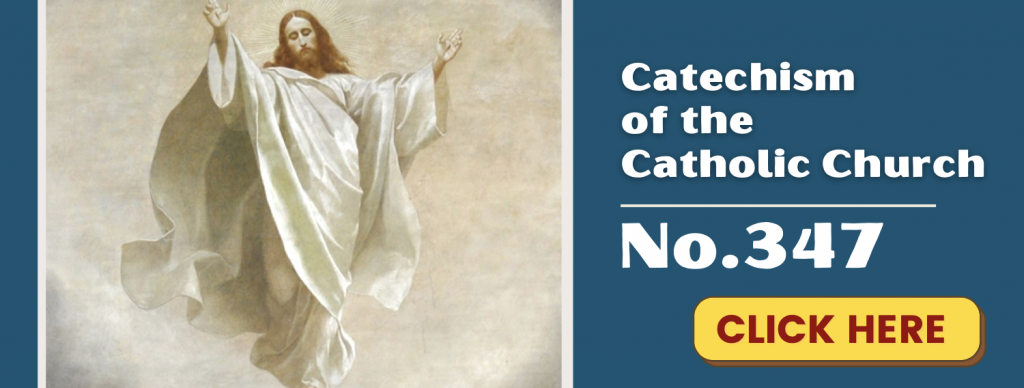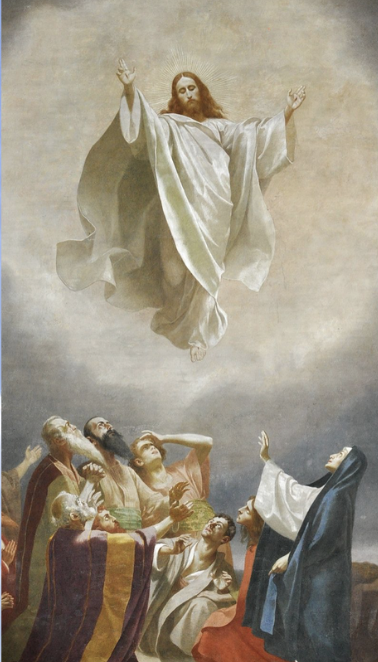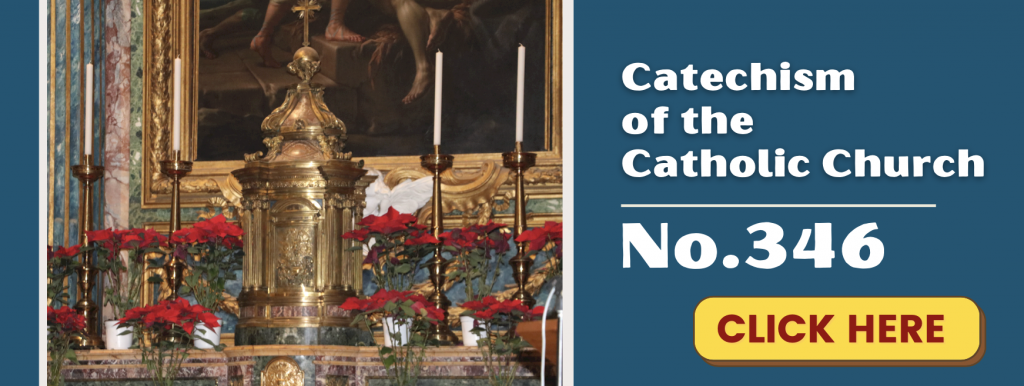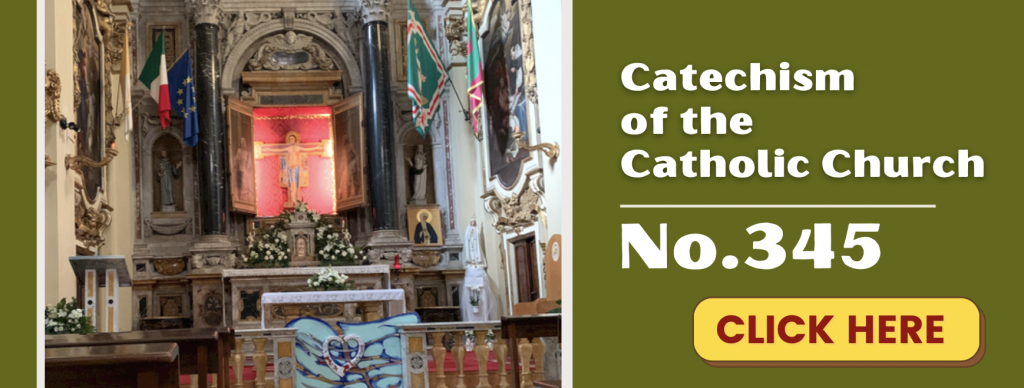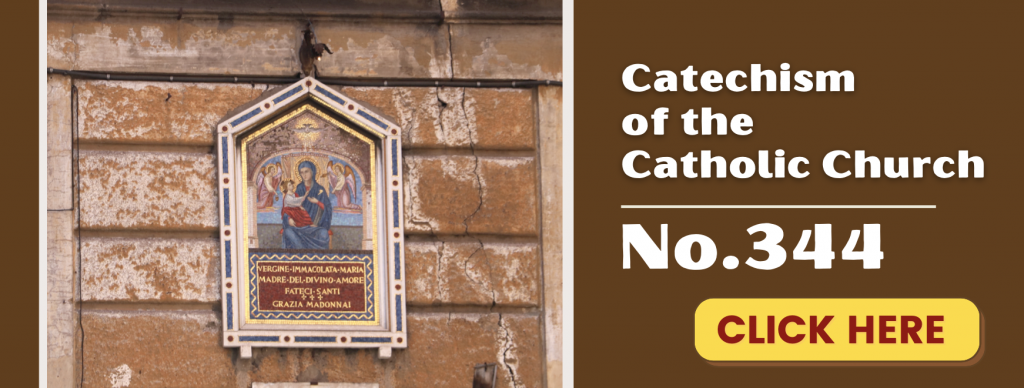Monday of the Seventh Week of Easter

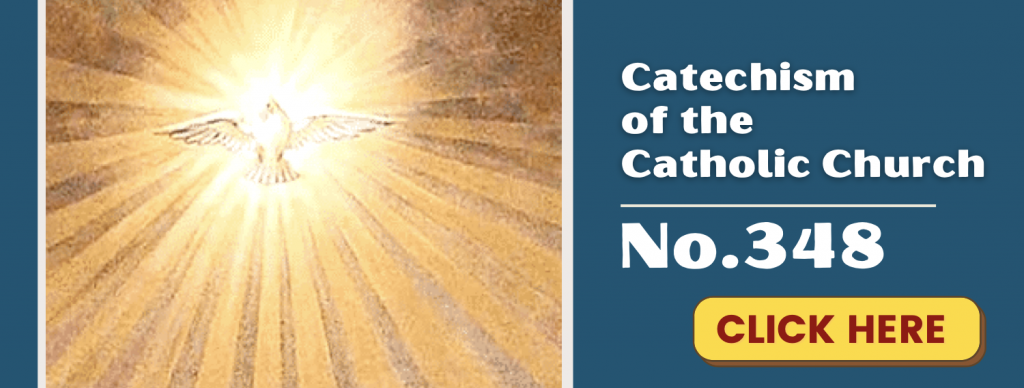

“For greater things you were born.” (Ven. Mother Luisita)
MONDAY, May 17th Mk. 16: 29-33 “In the world, you will have trouble, but take courage, I have conquered the world.”
- Jesus conquered through the Cross, opening the gates of heaven, closed by the sin of our first parents Adam and Eve, to all who choose to walk through them. We choose heaven or hell as our eternal destiny by the choices we make every day of our lives.
- “Whoever has my commandments and keeps them, he it is who loves me. And he who loves me will be loved by my Father, and I will love him and manifest myself to him.” (Jn. 14:21)
- Our lives are Spiritual Warfare! God gives us sufficient grace to keep the Ten Commandments, but the three enemies of our soul war against us: the devil, the world, and our own weak flesh! That said, our ultimate deadly enemy is the devil, for he uses the temptations of the world and the weakness of our flesh to tempt us to all that is sinful, evil and ungodly!
- With this in mind, let us meditate on and put into practice the battle plan proposed by Fr. Ed Broom, remembering that with our good will and efforts, God’s grace is sufficient!
STRATEGY TO CONQUER THE ATTACKS OF THE DEVIL—THE TEN-STEP BATTLE PLAN! By Fr. Ed Broom, OMV
Soldiers study to find the weak point of their enemies so as to attack and conquer. Wrestlers, Boxers also try to discover where their opponents have an opening so as to punch hard or tackle to the ground for the knock-out or countdown. Those engaged in a serious debate, study to capture where their opponent has no argument or defense for the verbal debate and victory.
Equally important is the knowledge we must acquire so as to attack, as well as to defend ourselves, against the deadly assaults of the devil in our spiritual battle, our spiritual wrestling or boxing match.
The wise men of the past insisted on the capital importance of SELF-KNOWLEDGE. The Desert Fathers coined the axiom, short but poignant: KNOW THYSELF! The wise Socrates expressed it in these words: “A life not examined is a life not worth living.” An Historian quipped up with these sage words: “He who does not know History is condemned to repeat the same errors.”
That said, what is one of the essential elements for making a Good Sacramental Confession? To be direct, not simply detecting the sin and confessing it to the priest, but also examining the reason that led us to commit that sin.
Finally, one of the essential hallmarks of Ignatian spirituality is the practice of the classical “Daily-Examen.” Saint Ignatius stated forcefully that this practice should never be omitted. By this practice one comes to know with greater clarity and precision the working of God’s grace, the maneuvers of the devil, and a greater self-knowledge.
Therefore, the basic purpose of this essay is not simply to know the tactics of the devil, who in the words of Saint Ignatius is the enemy of our salvation, but also to formulate clear guidelines and practices to conquer the enemy.
In a word, we must formulate a clear spiritual strategy to conquer the presence, the perniciousness, and the power of the devil in our lives. We should never forget the words that Jesus uses to describe the devil: “He is a liar and a murderer from the beginning.”
TEN STEP STRATEGY TO CONQUER THE DEVIL
1. IN DESOLATION—USE FOUR PRACTICES TAUGHT BY ST. IGNATIUS. In Rule Six of the Rules for Discernment, Saint Ignatius offers us four practices to use when we find ourselves in the state of desolation—in other words, when we find ourselves sad, discouraged, and depressed. These are: prayer, meditation, penance, and examination of conscience.
a) PRAYER. Pray more, rather than less. Prayer conquers the devil!
b) MEDITATE. Read and meditate upon the Word of God. St. Paul calls it a two-edged sword meant for the battle.
c) PENANCE. Jesus states clearly that some devils are cast out only by prayer and fasting.
d) EXAMINATION OF CONSCIENCE. Find out what is casting you into the state of desolation.
2. KRYPTONITE RULE—PRACTICE THE OPPOSITE VIRTUE. In desolation, the devil aims at our spiritual weak point and he goes for the kill. Get to know yourself; get to know your Kryptonite, your Achilles heel, your point where you are most vulnerable. The list of the CAPITAL SINS is the key to self-knowledge. When tempted in that weak-point you must strive to practice the opposite virtue.
Capital Sins and the opposite virtue to be practiced. (The Agere Contra)
a) GLUTTONY—THE VIRTUE OF TEMPERANCE IN EATING
b) LUST—THE VIRTUE OF PURITY OR CHASTITY OF LIFE
c) AVARICE—THE VIRTUE OF GENEROSITY IN GIVING
d) SLOTH/LAZINESS—THE VIRTUE OF DILIGENCE IN WORK.
e) ENVY—THE VIRTUE OF ADMIRATION OF OTHERS AND GRATITUDE
f) ANGER—THE VIRTUE OF PATIENCE AND MEEKNESS
g) PRIDE—THE VIRTUE OF HUMILITY
3. PROCRASTINATION—WORK ETHIC (SHORTNESS OF LIFE!) To overcome the devil of procrastination—put it off until tomorrow, a concrete remedy must be applied. Write out a PLAN OF LIFE and be faithful to it. Ask your Spiritual Director to assist you! This helps to order the disorder in our lives. The Procrastinator lives a disorderly existence.
4. RESENTMENT AND REVENGE—THE PRACTICE OF IMMEDIATE FORGIVENESS AND MERCY. The devil works overtime in bringing to mind present or past hurts and injuries. If we dwell on these, we will live an angry and depressed existence. The best remedy is to live the Gospel of Mercy and forgive those who hurt us immediately. And if the devil brings the hurt or injury to mind again, forgive again immediately! A sure sign of forgiveness is to pray for that person. Each time they come to mind, say three Hail Marys for them. The Bible teaches us clearly: “Do not let the sin go down on your anger.” (Eph. 4:26)
5. WORLD OF IMAGES—TEMPTATION TO VIEW PORNOGRAPHY—SEEK GOOD IMAGES!!! The wolf is on the prowl, better said, many wolves are on the prowl related to the world of images and most specifically, the reality of pornography. Surround yourself—in your room, home, and car with beautiful images of Jesus, Mary, the angels and the saints. Therefore, when tempted to go down the dark and ugly path of porn, look at these beautiful images as a reminder of your dignity and your destiny. We are Temples of the Holy Spirit; our destiny, Heaven with God forever!
6. LAZINESS/ SLOTH/INDOLENCE—THE ETHIC OF HARD WORK, SHORTNESS OF LIFE. How true the saying: “Idleness is the workshop of the devil.” If you have nothing to do, the devil will offer you tons of activities to do with him and for him. Meditate on how short our life is on earth and how we will be judged by our actions. Let us work hard in this life, in imitation of the saints, and then we can rest forever in Heaven.
7. BAD COMPANY CORRUPTS MORALS—CHOOSE ONE OR A FEW GOOD FRIENDS. The Bible teaches us that a true friend indeed is a treasure and a brass wall of defense. On the contrary, a bad friend or friends could be our ruin or demise. Bad friends lead us into sin; good friends lead us to Jesus, Our Best of Friends, and eventually Heaven. As soon as we are aware of a noxious and poisonous friendship—formed by the devil—terminate this relationship!
8. WANDERING EYES (REMEMBER THE SIN OF DAVID!)—LIVE IN THE PRESENCE OF GOD. If we have the tendency to allow our eyes to wander where they should not be going, then we must form the habit of living in the PRESENCE OF GOD! If we are keenly aware of God’s eyes looking at us with love and concern, it will be much more difficult to wander and fix our eyes on what is offensive to God.
9. DEVIL OF DISOBEDIENCE—OBEY WILLINGLY AND PROMPTLY! The devil sinned due to disobedience. He cried out in rebellion against God: “I will not serve!” Therefore, whenever we are tempted to imitate the devil in his disobedience, we must call to mind the obedience of Jesus and Mary to the will of God, to help us obey promptly. Remember the words of St. Paul: “Jesus was obedient, even to death and death on the cross.” (Phil 2:8)
10. DEVIL OF COLDNESS TO AND REJECTION OF MARY—TENDERNESS AND LOVE FOR MARY!!! One of the tactics of the devil is to seduce and trick people to leave the Catholic Religion and enter a Religious Sect or Protestantism. Almost immediately these false-religions will attack the Blessed Virgin Mary or at least show great coldness or indifference towards Mary. If we are tempted in one way or another to reject Mary or to show Mary coldness or indifference, then we should do the opposite. How? Read a good book on Mary. Enthrone an image of Mary in your room. Pray the most Holy Rosary. Cultivate filial devotion to Mary!
In conclusion, we have concluded our mini-course on the Strategy that we should implement in our battle against the devil in our lives. Indeed, not only must we know the tactics and the temptations of the devil, the enemy of our salvation, but how we are to react to put out the fiery darts of the devil. May Our Lady help us, by her powerful intercession, to crush the ugly, infernal head of the devil in our lives so we can serve Our Lord and Savior, Jesus the King!
Copyright 2021 Oblates of the Virgin Mary – St. Peter Chanel Church, Hawaiian Gardens, CA

